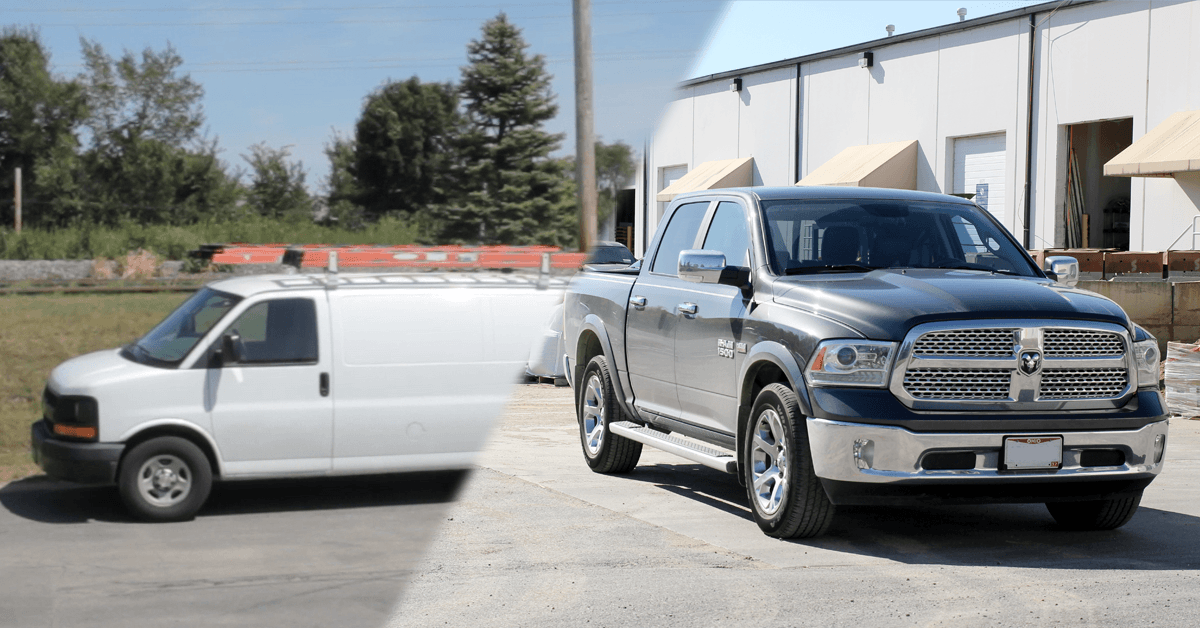Truck vs. Van: Which is the best field service vehicle?
By Randy Breneman on Thursday, November 7, 2019Which service vehicle will better suit your needs, a truck or van? We break down the pros and cons.
As a field service professional, you pretty much need a truck or van. When you need to haul essentially a workshop’s worth of tools and equipment from site to site, you need the space and versatility offered by these vehicles to stay organized, efficient, and safe. A sedan just doesn’t cut it.
But have you ever thought about which vehicle you should go with? Which is the better option, the truck or the van? Which vehicle will work best for your particular field? We’ll run through some key considerations.
Do you need to tow anything?
Trucks have greater towing capacity than cargo vans, so if you often need to haul a trailer or piece of machinery from site to site, a truck is simply better equipped for the job. With the right engine and structure, a cargo van can also tow some loads with a basic bumper pull. If towing is a regular part of your daily work, having at least one truck as part of your fleet definitely makes sense. (That’s an important consideration, too. You can mix and match when building up your fleet. You don’t need to have all trucks or all vans.)
Do you often have passengers?
Cargo vans can seat two people in the front seat, or possibly three with bench seats. In contrast, a truck often has a second row of seats along with plenty of space in the truck bed for tools and materials. If you have apprentices or crew members who travel with you, everyone will appreciate a little more room when moving from job to job.
Do you haul long, awkward, or heavy items?
Panes of glass, ladders, and long pieces of wood or pipes are easier to load and access from a truck. While it’s not completely impossible to load these on top of or inside a van, it does take a little more care and finesse to do so. With a truck, you can drop heavy or awkward items in from above, from the side, or from the back and maneuver with far greater range than with a van.
Do you ever have to off-road?
Do your field service exploits ever land you in a literal field? If so, you’ll appreciate the abilities of a four-wheel truck to make navigating off-road a little easier. Trucks also sit higher off the ground than vans, which means they won’t bottom-out on awkward terrain. Four-wheel drive and a raised chassis are uncommon options on cargo vans, which are better suited for paved roads. You can, of course, customize a van to have these features, but this will cost you a pretty penny.
Do you carry fragile, valuable or dangerous materials?
If your materials, supplies, or equipment were to get rained on, would you lose money? If so, you definitely need to protect your cargo in a van. Otherwise, you’ll need a weatherproof method for transporting items in a truck, such as a truck bed cover. If purchasing a cover, take care to get one that has sufficient height for your needs.
Also, think about the security that a cargo van offers. If you have valuable equipment that you want to keep locked away (and hidden from view), then a cargo van provides more security. If you transport potentially dangerous materials, locking them in a van allows you to restrict access and protect children, pets, and unauthorized personnel.
Do you plan to cover your vehicle in advertising?
If part of your marketing plan involves covering your vehicle in decals that can be seen from the back and side, then you’ll definitely want to use a van. Vans simply have more available space for logos, phone numbers, and photos. A good vehicle wrap doubles as one of the most effective ways to market and raise awareness for your business.
Crunching the Numbers
In addition to the above factors, you should also pay attention to fuel economy and price. Miles per gallon can vary from brand to brand, but vans generally get better mileage than trucks. They also tend to represent a cheaper purchase option. Diesel trucks will, of course, require diesel fuels, which will hit your wallet consistently over the years.
Don’t forget to read reviews on various brands to understand the average cost of maintenance. Regardless of whether you choose a truck or a van, you want a durable brand with easy-to-source replacement parts, not a vehicle that threatens to break down as soon as you’ve finished paying for it.
The truck vs. van debate is often personal.
From the above descriptions, you can quickly see that this choice often boils down to personal preference. If your competitors drive trucks and you simply prefer a van, there’s no rule that says you can’t drive a van. But if you’re on the fence about which one you like better, consider renting or leasing your first company vehicle. If you don’t like it, trade it in for the other model.


